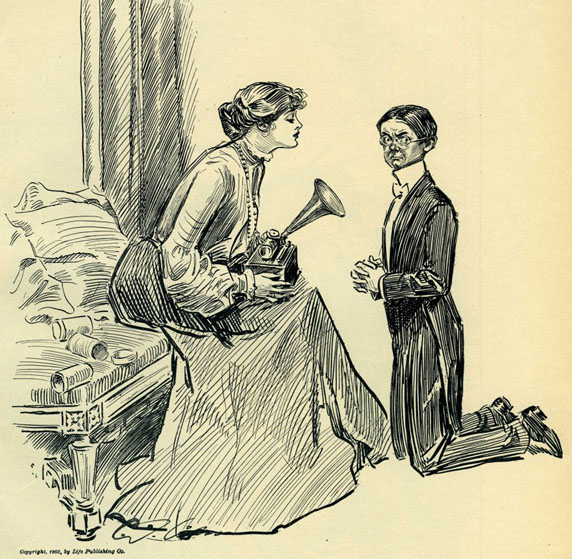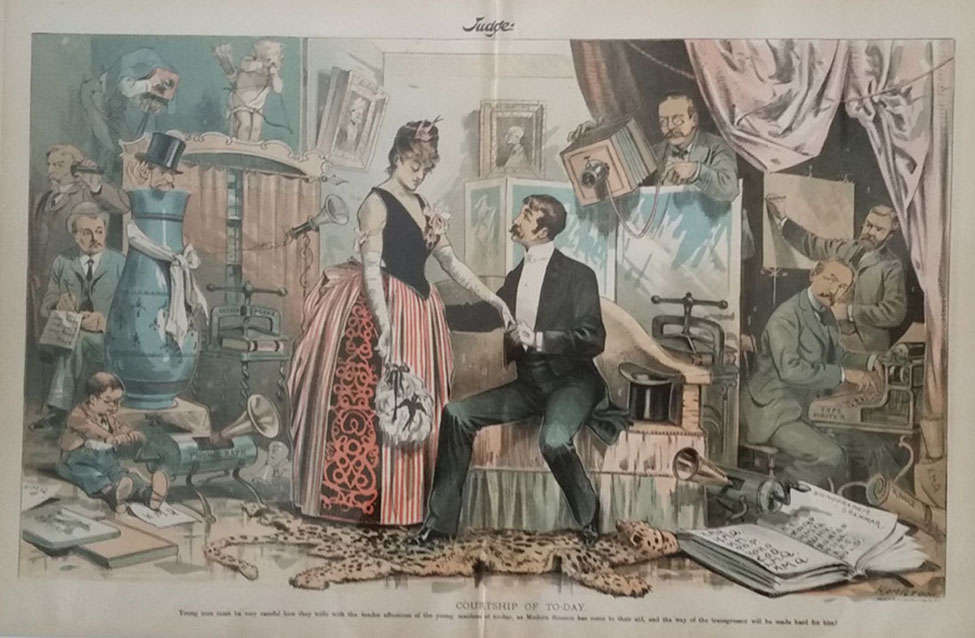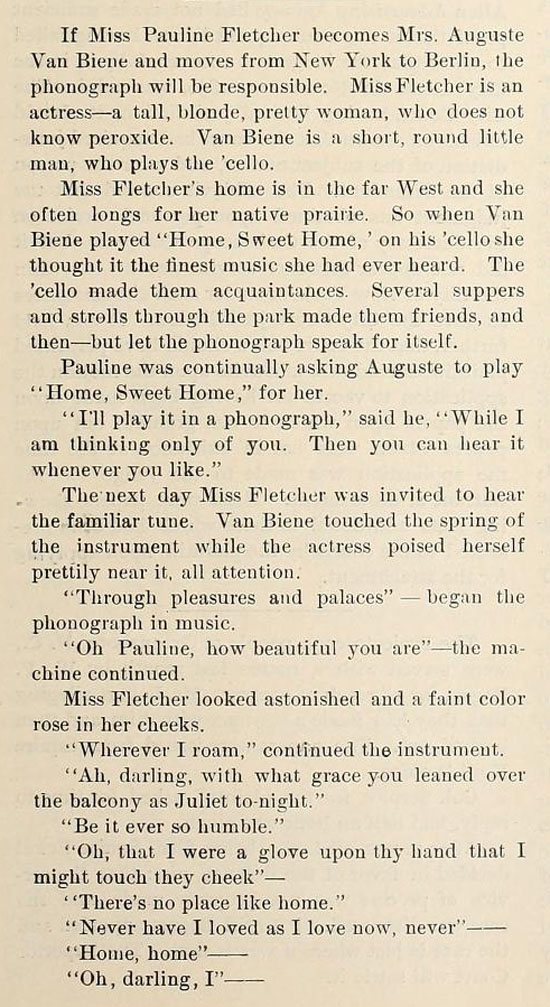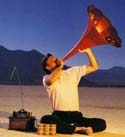Courtship, Proposals and the
Phonograph

The Phonograph's Role in the Steps
Towards Matrimony
By Doug Boilesen, 2022
The phonograph's revolution included
its participation in sometimes unexpected aspects of daily life. One
of these areas was its involvement with courtship all the way up to
the day of the wedding...or the day in court.
A machine that could record spoken words
with unimpeachable veracity would naturally become part of popular
culture and the humor of its time. Examples of the words of a participant
being unknowingly recorded and then later played back as evidence
of what had been said are numerous.
An early illustration of this was in
Judge magazine, January 28, 1888 titled "Courtship of
To-Day." Pictured in Grant E. Hamilton's lithograph are several
new sources from "Modern Science" capable of documenting
words and actions in ways never before available. Two Edison tinfoil
phonographs are shown ready to record whatever is said. Telephones,
two cameras, a stenographer, an illustrator, and a typesetter also
await the suitor's next step.
Judge's warning is clear:
"Young men must be very careful
how they trifle with the tender affections of the young maidens
of today as Modern Science has come to their aid, and the way of
the transgressor will be made hard for him!"

The Courtship of To-Day,
Judge, January 28, 1888 (PM-0519)

The Chadron Democrat,
Chadron, Nebraska February 2, 1888

Young Ladies' Anti-Breach
of Promise Protective assocation, The Rushville Standard, June
21, 1889

Breach of Promise Series,
postcard ca. 1908 (PM-0680)
Like the father capturing
the proposal with his camera, the Phonograph can captivate “sounds,
with or without the knowledge or consent of the source …” Thomas Edison,
“The Phonograph and its Future”, 1878

Have you had your Phonograph
taken yet? postcard ca. 1908 (PM-0235)

A Proposal by Gramophone,
postcard ca.1905 (PM-0652)
An article in 1891 by Edward
D. Easton titled "The Modern Talking Machine" enthusiastically
noted the impact the phonograph would have for lovers communicating
their thoughts when separated.

The Phonogram,
June-July, 1891

An Imaginative Proposal,
postmarked 1909 (PM-0270)

A Leap Year Proposal,
postcard ca. 1905 (PM-0266)

A Last Remembrance,
Life Magazine, 1903 (FOTP PM-1208)
Even if an illustration
wasn't included newspapers across the country repeated humor like
the above for their local readers. The Gordon Journal in Gordon,
Nebraska included "A Last Remembrance" in their
September 11, 1903 newspaper (and credited Life).
Engagement
Announcement
The following newspaper
story reports how one engagement announcement in Leominster, Massachusetts
in 1912 was performed using the phonograph.

The Nebraska State
Democrat, May 16, 1912

|
The engagement is off. He
was calling, and she pleasantly said: “I sang into a phonograph
to-day.”
“Indeed,” he replied, innocently.
“I suppose you broke the record.”
Humor
of the Day, Longmont Ledger, January 29, 1904
|
Post Marriage
After marriage the phonograph would
also be seen in popular culture as a potential participant (at least
as a humourous subject).

Recording the words of
a scolding wife for future use, postmarked 1908 (PM-0265)
Funeral for the wooer?
The following poem reveals the fate
of man wooing another man's wife, both unaware that a phonograph had
been hidden behind the door by the husband.

As reprinted by the Colorado
Springs Gazette, September 21, 1878
The Proposal, spoken
into a Phonograph - But did she become Mrs. Auguste Van Biene?


The Phonoscope,
April 1897
DIVORCE and the Phonograph

The Phonoscope,
December 1899
THE PHONOGRAPH BREACH OF PROMISE
The following song was sung by Mr. Bass
Kennedy on the 'Halls' in Scotland around 1900. It appeared in The
Talking Machine Review, Issue No. 3, April 1970, pp. 81-82,
and was contributed by William Gallacher.
The story tells how the telephone was
used to woo a young lass and how the phonograph brought justice against
the man on the other end of that phone who had promised marriage but
who had then married another.
THE PHONOGRAPH BREACH OF PROMISE
- Sung by Bass Kennedy
Miss' Mary Orr's uncle wis coalmaister
John
She managed his mansion hoose over at
Braidloan
But the plague o' her life was a new
telephone
'Tween the office and hoose it kep'
ringing
John's clerk wis a masher ca'd Masher
McClean
Wi' plenty o' siller though scanty o'
brain
And tae Mary a sang wi' this lovin'
refrain
He wis aye through the telephone singing
Chorus: -
Oh Mary, dear Mary, I now telephone
My love to my sweet little fairy
--
My beautiful own, when the roses
are blown
I am going to marry you Mary.
The roses had come an' gane 'wa' twa
three times
And Moll wis he 'rt seek o' his havers
and rhymes
For he wantit tae ken hoo the dollars
and dimes
Wad divide if her uncle wis deein'
A'e day whin the masher wis howlin'
his sang
On the telephone, bachelor John cam'
alang
As the sportive refrain through the
corridor rang
An' Miss Mary gaed up the stair fleein'.
Chorus: -
John flate on Miss Mary and swore at
McLean
But laughed up his sleeve as he heard
her explain;
Then says he, ”Ma braw Lassie jist lea
him alane
for your roses he he'll never get smellin'
"
An' syne for sax morning's the clockmaker
Dean
Wis up at Braidloan wi' his speakin'
machine
And ilk mornin' he phonographed clever
and clean
A' the nonsense the masher wis yellin'.
Chorus: -
The masher no' seein 1 Moll's siller
in view
He wooed a rich widow an' mairrit her
too
Then says Uncle John - "Noo fur a hullaballoo”
An' he aff wi' the phonograph grinnin'
Gaed straight tae the lawyers ca'd
Hunter and Hounds
And entered an action for five thoosan'
pounds
While proving the promise the comical
sounds
Cam' aff o' the cylinders spinnin'
Chorus:-
The masher wis summoned and dully he
swore
He had never promised tae Miss Mary
Orr
"Your memory” the judge says ”We'll
maybe restore
When you hear your voice singing before
us”
The jury retired and before very long
The judge gave five thoosan' 'mid cheers
frae the thrang
And the phonograph loudly repeated the
sang
While the jurymen j''ined in the chorus.
Chorus:-
BREACH OF PROMISE SERIES

This 1908 postcard shows a marriage
proposal being recorded as potential evidence for enforcing a
promise. Note that the father in the background is also taking
a photograph to document this event. This image also reinforces
Edison's statement that "The Phonograph can captivate “sounds,
with or without the knowledge or consent of the source …” Thomas
Edison, “The Phonograph and its Future”, 1878.
My personal favorite
popular culture example of the phonograph being used in a court
case is from the 1901 Musical Comedy "The Head Waiters."
Pictured in the sheet music (below) are the Boss and Susan, his
typist, during their courtship and out for dinner. One of the
songs from this musical is titled "Susan, Dear Sue (Phonograph
Song)" with the boss, who was in love with Susan, saying
"“You’re name Susan, won’t do; Link it with mine forever”.
Be mine dear from today and I will part from you never.”
The boss, however, breached his promise
of marriage and “Susan, dear Susie, did Sue.”
Susan's legal case was strong
since had made a phonograph record of his wooing which she
brought as a witness in the court.
Thanks to the phonograph recording
Susie won her case.
Here are the lyrical details
of how Susie, not to be trifled with, executed her precautions
with a Phonograph:
“Once with
a Phonograph near her,
Set to record
all that he’d say,
With graces
that made him revere her,
She caused
him to plead in this way:
Sue, Sue, Susan,
dear Sue,
I’m in love
dear, with you
You’re name
Susan, won’t do;
Link it with
mine forever,
Be mine, dear,
from today
and I will
part from you never.”

Phonographia
|